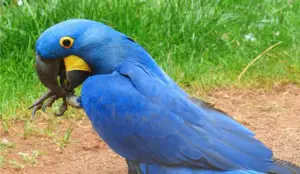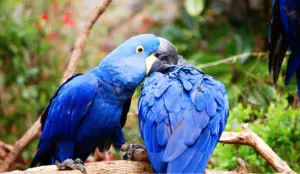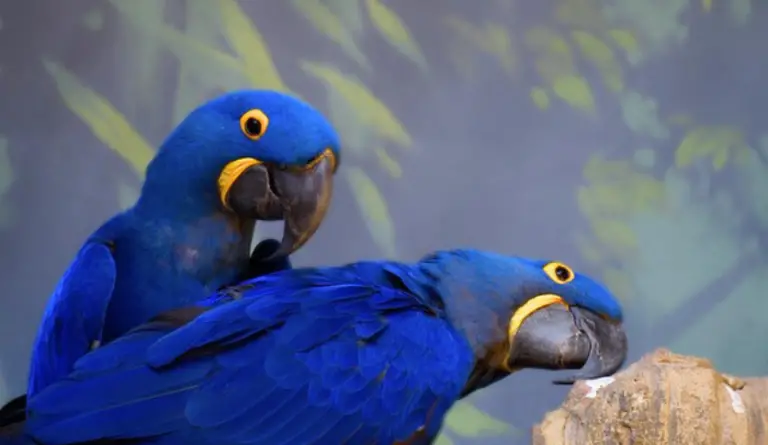Are you fascinated by the vibrant beauty of Blue Macaws and considering bringing one into your home? You’re not alone. These stunning birds, known for their striking blue feathers and engaging personalities, are a dream for many bird enthusiasts. However, a crucial question often comes to mind: “How much is a Blue Macaw?” Before committing this significant commitment, understanding the financial aspect of owning a Blue Macaw is essential.
This article aims to comprehensively understand the costs involved in acquiring and caring for a Blue Macaw. From initial purchase prices to ongoing care expenses, we’ll dive into everything you need to know, ensuring you’re fully informed about this beautiful yet substantial commitment.
What Determines the Cost of a Blue Macaw?
Factors like rarity, demand, breeding challenges, and upkeep needs influence the price of a Blue Macaw.
The Blue Macaw, especially the Hyacinth Macaw, is considered a rarity in the avian world. Their striking appearance and limited availability spike their demand. Breeding them is a complex and delicate process, contributing significantly to their cost. Their maintenance, including specialized diet and habitat needs, also adds to the overall expense.
How Much Should You Expect to Pay for a Blue Macaw?
The average cost of a Blue Macaw ranges significantly, typically between $1,500 to $15,000.
This wide price range depends on various factors, including the bird’s age, health, and breeding. Younger, healthier birds from reputable breeders tend to be more expensive. Remember, the initial purchase is the beginning of your financial commitment to these majestic creatures.
What Does It Take to Maintain a Blue Macaw?

Caring for a Blue Macaw means regularly spending on food, health, and living space.
Owning a Blue Macaw isn’t just about enjoying its bright blue feathers and charming character; it’s also about meeting its daily needs, which can add up. Let’s break down these costs so you can get a clear picture.
A Balanced and Nutritious Diet
Blue Macaws need a diet that’s both nutritious and varied. Their meals should include a mix of nuts, fresh fruits, and specially formulated pellets. These aren’t your average bird food and can be quite pricey. For instance, macadamia nuts, a favorite for many Blue Macaws, come with a high price tag. And since these birds are big eaters, the monthly grocery bill for your feathered friend can quickly become a significant part of your budget.
Regular Veterinary Care
Just like any pet, Blue Macaws require regular check-ups to stay healthy. These visits to the vet aren’t just for when they seem under the weather. Routine health checks are crucial to catch any issues early on. Remember, treating a bird is often more specialized than treating a cat or dog, and this specialization can mean higher vet bills. Also, consider setting aside a fund for emergency health care, because unexpected illnesses or accidents can happen.
Creating a Suitable Home
Blue Macaws are large birds that need space to stretch their wings. A sturdy, spacious cage is a must, and it’s not something where you’d want to cut corners. A good cage can be a significant one-time purchase. But that’s not all. These birds are intelligent and active, so they need toys and perches to keep them engaged and happy. Over time, these items will wear out and need replacing.
Don’t Forget the Extras
Other costs might not come to mind immediately. Think cleaning supplies for their cage, costs for bird-sitting if you travel, and even higher utility bills, as some macaws require a warm environment.
Legal and Ethical Considerations in Acquiring a Blue Macaw
When it comes to getting a Blue Macaw, it’s not just about the price tag. Legal and ethical factors play a big role in both the cost and how easy it is to find one of these birds.
Owning a Blue Macaw isn’t as simple as just paying the price and bringing one home. There are important laws and ethical issues to think about. These birds aren’t just pets; they’re part of our world’s precious wildlife, and how we treat them matters a lot.
First off, there’s something called CITES – the Convention on International Trade in Endangered Species of Wild Fauna and Flora. This is a big deal because it’s all about protecting animals like the Blue Macaw from being taken from the wild and sold. Blue Macaws are often listed under CITES, which means there are strict rules about buying and selling them. This is to stop illegal trading, which can really hurt their chances of survival in the wild.
So, when you’re looking to get a Blue Macaw, you need to make sure everything is legal. This means buying from breeders who follow the law, have the right paperwork, and don’t harm the natural populations of these birds. Yes, this might mean the bird costs more, and it might take longer to find a legal, ethically-bred Macaw. But it’s worth it. You’ll know you’re not harming the species and are supporting good breeding practices.
Where can you find and safely purchase a Blue Macaw?
When it comes to adding a Blue Macaw to your family, the most critical step is finding a reliable and ethical place to make your purchase. It’s not just about finding a bird; it’s about ensuring you’re getting a healthy, well-cared-for companion from a source that respects animal welfare.
Where to Start?
Begin your search by looking for reputable breeders or well-established adoption centers. These places are more likely to provide birds that have been raised in healthy environments and received proper care. But how do you identify a reputable source? Here are some tips:
- Do Your Research: The internet is a great starting point. Look for reviews, testimonials, and any information about the breeder or adoption center. A good reputation often speaks for itself.
- Ask for Recommendations: Bird enthusiasts, veterinarians who specialize in birds, or local bird clubs can be great resources for recommendations.
- Visit in Person: If possible, visit the breeder or adoption center. This gives you an opportunity to see the conditions in which the birds are kept. Healthy living conditions are a good indicator of a reputable source.
- Ask Questions: Don’t hesitate to ask the breeder or adoption center staff questions. Inquire about the bird’s health history, parentage, diet, and any special care requirements. A trustworthy source will be transparent and willing to share information.
- Look for Red Flags: Be wary of prices that seem unusually low. While it might be tempting, it often indicates a compromise in the bird’s health or breeding conditions. Also, avoid sellers who are unwilling to provide detailed information or seem to be rushing the sale.
- Legal and Ethical Considerations: Ensure that the seller adheres to all legal requirements for selling exotic birds. This includes CITES (Convention on International Trade in Endangered Species of Wild Fauna and Flora) certifications where applicable. Ethical breeders and adoption centers will prioritize the bird’s welfare over making a quick sale.
- Prepare for a Commitment: Remember, owning a Blue Macaw is a long-term commitment. Be prepared for not just the financial investment, but also the time and dedication required to care for these magnificent birds.
By following these guidelines, you can increase your chances of finding a Blue Macaw from a source that is both ethical and dedicated to the well-being of their birds. It’s not just about bringing a new pet into your home; it’s about ensuring the health and happiness of your new feathered friend for years to come.
What Are the Unexpected Expenses of Owning a Blue Macaw?

Owning a Blue Macaw is a journey full of surprises, not just in their playful antics but also in the expenses. When we talk about the hidden costs, we’re referring to those unexpected expenses that aren’t immediately obvious when you first bring your feathered friend home.
Emergency Medical Care
First and foremost, let’s talk about health emergencies. Just like any pet, a Blue Macaw can have health emergencies that need immediate attention. This could be anything from a sudden illness to an injury. These situations often lead to emergency vet visits, which, let’s be honest, aren’t cheap. Veterinary care for exotic birds like Blue Macaws requires specialized knowledge, and such expertise comes at a cost. It’s not just the emergency treatments that add up but also the follow-up care, medication, and possibly even surgery.
Habitat Upgrades
Another aspect often overlooked is the cost of upgrading their habitat. As your Blue Macaw grows and matures, their needs change. What was a perfect living space for a young Macaw might not be suitable for an adult. You might need to invest in a larger cage or aviary, which provides adequate space for them to spread their wings and stay active. Remember, a happy bird is a healthy bird, and their habitat plays a massive role in their wellbeing.
Moreover, as time goes by, parts of their habitat will wear out and need replacing. This includes perches, toys, feeding bowls, and even the cage itself. These items aren’t just one-time purchases; they’re ongoing investments in your bird’s quality of life.
Unforeseen Circumstances
Lastly, there are always those unforeseen circumstances that you can’t predict. Maybe your Macaw develops a taste for a particular (and pricey) treat, or you find that their preferred bedding is more expensive than you thought. Perhaps you’ll need to hire a pet-sitter with experience in handling exotic birds when you’re away. These small, unexpected costs can add up over time.
FAQ about blue macaw
How long do Blue Macaws live and how does this impact cost?
Blue Macaws have a long lifespan, often living up to 50 years or more. This longevity means a long-term financial and care commitment.
Can I find a Blue Macaw for less in adoption centers?
Yes, adoption centers might offer Blue Macaws at a lower cost, but availability is often limited.
Are there any subsidies or financial aids available for Blue Macaw care?
Financial aids for exotic pet care are rare, but some specialized organizations might offer assistance.
What should I look for in a Blue Macaw to ensure I’m getting a healthy bird?
Look for vibrant feathers, clear eyes, and active behavior. Always consult a vet for a health check-up.
Is pet insurance available for Blue Macaws, and is it worth it?
Pet insurance for exotic birds is available and can be a wise investment to cover unexpected medical costs.
Conclusion
In wrapping up our exploration into “how much is a Blue Macaw,” it’s clear that the journey of owning one of these magnificent birds is both rewarding and financially significant. From the initial purchase to the unforeseen expenses, the cost of a Blue Macaw extends beyond just a price tag. It’s about investing in a living being that will bring joy, color, and life to your world. Remember, owning a Blue Macaw is not just about affording it; it’s about being prepared for the long-term commitment and responsibilities that come with it.
Whether it’s regular health check-ups, habitat upgrades, or emergency care, every aspect contributes to the well-being of your feathered friend. As you consider welcoming a Blue Macaw into your life, remember that this decision is not just a financial one but a commitment to nurture and care for an extraordinary companion.

Hi, I’m Regina Rios. Just another bird lover who loves to share knowledge from personal experience. I’ve grown up with pet birds since childhood as my mommy also loves birds. As I can’t pet many birds in open air in my house as my mom does; I created my first bird cage on my rooftop using wood, copper wire, and a metal shed in 2018 and start collecting pet birds. Now, I have so many pet birds such as Macaws, Parrot, Cockatiel, Parakeet, and others. Not only that, if I see natural birds are injured I keep them in my house until they get well. Now, my hobby becomes my income source as my home birds have babies and I sell them to birds lover like mine. I’ve created this blog to inspire others bird owners by sharing my personal knowledge. Good Luck!

